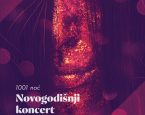
NEW YEAR’S CONCERT – “1,001 NIGHTS”
Riječki simfonijski orkestar
PROGRAM
Jean Sibelius (1865 – 1957):
En saga (A Saga), Op. 9
Carl Nielsen (1865 – 1931):
Aladdin, suite (excerpts), Op. 34 / FS 89
I – Oriental Festival March
V – The Marketplace in Isphahan
VII – Negro Dance
Alexander Porfiryevich Borodin (1833 – 1887):
Polovtsian Dances, ballet scene from Act II of the opera Prince Igor
***** intermission *****
Nikolai Rimsky-Korsakov (1844 – 1908):
Scheherazade – symphonic suite Op. 35
I – The Sea and Sinbad’s Ship
Richard Wagner (1813 – 1883): Lohengrin – Prelude to Act I
Johann Strauss II. (1825 – 1899):
Egyptischer Marsch (Egyptian March), Op. 335
Tausend und eine Nacht (Thousand and One Nights) – waltz, Op. 346
Tritsch-Tratsch Polka (Chit-chat Polka) Op. 214
Rosen aus dem Süden (Roses from the South) – waltz, Op. 388
Unter Donner und Blitzen (Beneath Thunder and Lightning) – polka, Op. 324
The concert is performed with one intermission and lasts approximately two hours
Tonight we’re going to go on a journey through the world of myths and fairytales. A journey that is taking us from the trials and tribulations of the past year to a new year of hope.
We invite you to use Sibelius’ “En Saga” as a moment in which your thoughts can fly along with the music. The composer called the piece a tone poem without program (which means without a concrete story or clear picture behind it). He intended for the audience to create their own story, using their own imagination and emotions. Yet by calling it “En saga” he implies a mysterious canvas on which this music can unfold. Tonight it can also be experienced as a moment to contemplate on the ending old year before looking to the New Year with optimism and fresh energy.
Nielsen’s Aladdin has a clear program and is originally written as incidental music to a play based on the story from 1001 nights. He is creating a strange, for our ears clearly oriental world of sound that immediately transports us into distant spheres of intriguingly exotic appearance. (Like the other composers of tonight’s concert, i. e. as a western musician of the last two centuries, of course he can do this only with his given western tools giving us his impression of the oriental sound-world, if perhaps not an authentic one.)
Between the festive and pompous Oriental March and the rhythmically energetic African Dance we are going to perform the Marketplace of Isphahan. This piece has to be pointed out especially: Nielsen’s intend is to create an impression of the acoustic experience that one has when walking over that crowded place, at points hearing a marching band from afar at others the music of a snake charmer. Here he wrote in an innovative manner for four groups of the orchestra that are playing at the same time unrelated music in different speed, color and volume.
Borodin’s Polovetsian Dances from his opera “Prince Igor” is one of the most popular and most beautiful pieces of Russian classical music. Borodin, who was mainly a chemist and only in his free time a composer, left us with these dances an incredibly dense moment of extremely touching and exciting music, full of orientalisms in scales harmonics and instrumentation.
With Rimsky-Korsakov’s Sheherazade we get as close as possible to the middle eastern folk tale collection “1001 nights”. There in the frame story the young Sheherazade is saving herself from being killed by telling the king every evening a story not finishing it before the next night and starting a new one every evening for 1001 nights.
In Rimsky-Korsakov’s piece the young Sheherazade is impersonated by the Solo-violin, that musically speaking starts to tell the story. Then with the orchestra the actual tale about Sindbad and his ship begins. Also Rimsky-Korsakov (who was prominently involved in the process of the completiton of Borodin’s “Prince Igor”) is exploring a specific oriental atmosphere in the musical language that inspires the musicians and the audiences imagination.
With Wagner’s Prelude to his mystic-romantic Opera “Lohengrin” we’ll have one more moment of pause before fueling up optimism for the new year with the positive and joyful music by Johann Strauss, who knew how to drum up festive mood like no other: After two lesser known and slightly oriental colored pieces (his Egyptian March and the Waltz “1001 nights” after themes from his operetta “Indigo and the fourth thieves”) we are allowing some of his most famous waltzes and polkas to take us over the doorstep to 2022 in a light and dance-like manner.
We wish you a happy, healthy and hopeful New Year!
General sponsor of the Rijeka Symphony Orchestra
Sponsor




